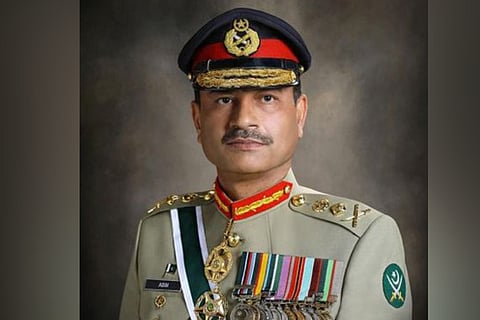

Repeating the military establishment’s old ideological line, Pakistan Army chief General Asim Munir has said that Pakistanis must remind their children of the “stark differences between Hindus and Muslims” — calling it the very basis for the country’s creation.
Speaking at a Convention for Overseas Pakistanis on Wednesday, Munir said: “Our forefathers believed that we were different from Hindus in every possible aspect of life. Our religion is different. Our customs are different. Our traditions are different. Our thoughts are different. Our ambitions are different… That was the foundation of the Two-Nation Theory. It was laid on the belief that we are two nations, not one.”
“You must tell this to your children so that they never forget the story of Pakistan,” he added, with Prime Minister Shahbaz Sharif in attendance.
The Two-Nation Theory, advocated by Pakistan’s founder Muhammad Ali Jinnah in the 1940s, held that Muslims and Hindus were two separate nations. It was on this basis that Jinnah demanded a separate homeland for Muslims, leading to the creation of Pakistan in 1947.
Munir, who is often referred to as a ‘Hafiz e Quran’ for having memorised the Islamic holy text, also stressed the country’s Islamic foundations. “The basis of Pakistan was laid on the Kalima,” he said, referring to the Islamic declaration of faith.
His remarks come days after a fresh diplomatic clash between India and Pakistan. During a United Nations debate on peacekeeping reforms, Pakistan once again brought up the Kashmir issue. India responded sharply, asking Islamabad to vacate parts of the region it “occupied illegally”.
Speaking about Kashmir, General Asim Munir said, "Our stance is absolutely clear, it was our jugular vein, it will be our jugular vein, we will not forget it. We will not leave our Kashmiri brothers in their heroic struggle."
Munir’s comments also come at a time of internal unrest. Addressing the situation in Balochistan, where separatist groups continue to challenge state authority, the Army chief issued a warning. “Even ten generations of terrorists cannot harm Balochistan and Pakistan,” he said, vowing action against what he called anti-state elements.
Munir also said that many fear that Pakistan won't get investment due to terrorist activity. "Do you think terrorists can take away the destiny of the country? The 1.3 million-strong Indian Army, with all its wherewithal, if they cannot intimidate us, do you think these terrorists can subdue the armed forces of Pakistan?" he said.
While Pakistan was founded as an Islamic republic, its early leadership had promised protection for religious minorities, including Hindus. Over the decades, however, the number of minorities in the country has steadily declined. Munir’s speech, with its emphasis on religious identity and historical divisions, signals the military’s continued reliance on the Two-Nation Theory to shape national identity and assert its position both at home and abroad.